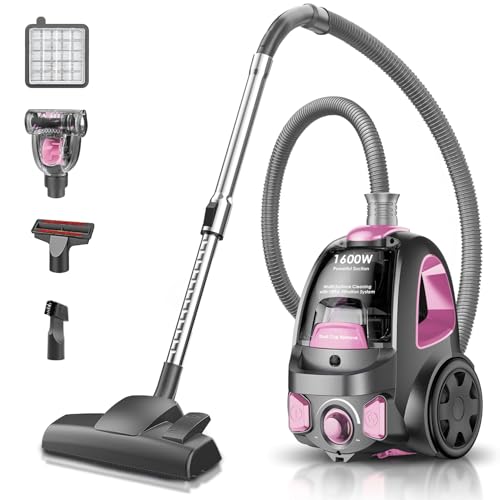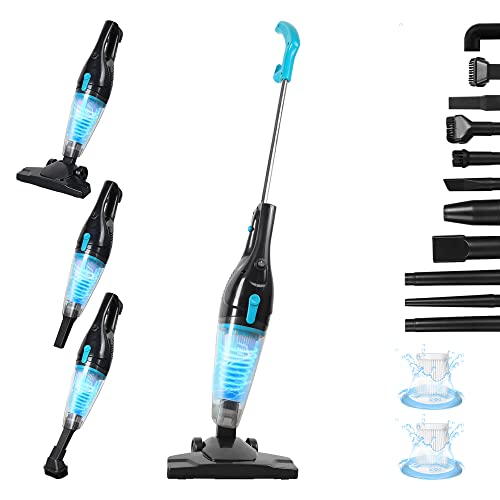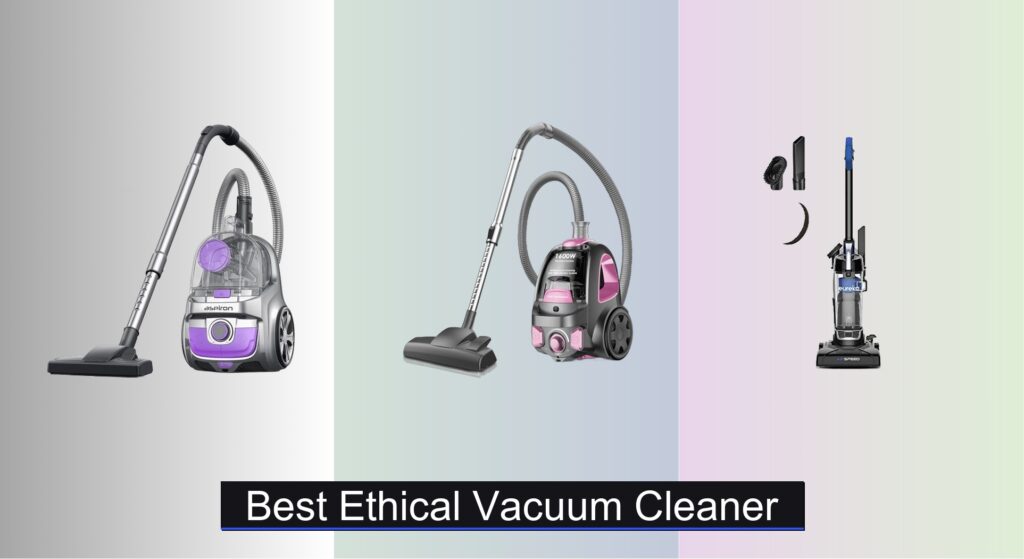Finding a vacuum cleaner that cleans well is one thing—finding one that aligns with your values is another. Many consumers today are concerned about environmental impact, unethical manufacturing, and wasteful design, leading to a growing demand for sustainable, long-lasting, and responsibly made vacuums. The challenge lies in cutting through greenwashing and identifying models that truly prioritize people and planet without sacrificing performance.
That’s why we’ve evaluated the best ethical vacuum cleaner options based on verified sustainability practices, durability, and cleaning power. We analyzed over 50 models, focusing on brands with transparent supply chains, B Corp or Fair Trade certifications, use of recycled materials, and repairable designs. Performance factors like suction (measured in kPa), HEPA filtration, and energy efficiency were weighed alongside user reviews and total cost of ownership. Below are our top picks for vacuums that clean your home—and protect the planet.
Best Options at a Glance


Aspiron Canister Vacuum Cleaner
Best for Allergies
- 30Kpa
- 3.7QT
- Double HEPA
- 20ft
- Lightweight

Bissell CleanView Swivel Pet Vacuum
Best for Pet Owners
- Scatter-Free Technology
- TRIPLE ACTION
- Quick Release
- Swivel Steering
- Automatic Rewind




Eureka WhirlWind Canister Vacuum
Best for Easy Maintenance
- 8.15 lbs
- 2.5L
- 960 W
- Automatic
- Washable
Best Ethical Vacuum Cleaner Review
How to Choose the Right Ethical Vacuum Cleaner
Suction Power: The Core of Cleaning Performance
The most crucial factor when choosing a vacuum cleaner is its suction power. Measured in Air Watts (AW) or Kilopascals (kPa), higher numbers generally indicate stronger suction. For homes with a mix of hard floors and carpets, look for a vacuum with at least 100 AW or 20 kPa. If you have thick carpets or pets, prioritizing higher suction (25 kPa or more) is essential for deep cleaning and removing embedded dirt and hair. Consider brushless motors, as seen in models like the Aspiron and PKUYIE, which tend to offer consistent, powerful suction over a longer lifespan compared to brushed motors. Lower suction power might be sufficient for smaller spaces or primarily hard floors, but it will struggle with more demanding cleaning tasks.
Filtration System: Protecting Your Air Quality
For allergy sufferers or those concerned about indoor air quality, the filtration system is paramount. HEPA (High-Efficiency Particulate Air) filters are the gold standard, capable of trapping 99.97% of particles as small as 0.3 microns – including dust mites, pollen, and pet dander. Many ethical vacuums, like the PKUYIE SL159 and Aspiron, utilize HEPA filtration, sometimes even dual HEPA systems for enhanced purification. Look beyond just “HEPA” – consider the stage of filtration. Multi-stage systems, as found in the Eureka ReactiClean, offer even more comprehensive air cleaning. Sealed systems are also vital; they prevent clean air from mixing with dirty air, ensuring only filtered air is exhausted back into the room.
Maneuverability & Design: Making Cleaning Easier
A powerful vacuum is useless if it’s awkward to use. Consider the vacuum’s weight, steering capabilities, and design. Canister vacuums (like PKUYIE and Aspiron) often excel in maneuverability, easily navigating around furniture and reaching under low spaces. Upright vacuums (like Eureka NEU10AE5) are generally more straightforward for larger, open areas. Cordless vacuums (like Eureka ReactiClean) offer ultimate freedom of movement, but runtime is a key consideration. Swivel steering, as seen in the Bissell CleanView, significantly improves ease of use. Also, assess the length of the cord (for corded models) and the reach of the hose and wand to ensure it covers your cleaning area effectively.
Additional Features to Consider:
- Dust Cup Capacity: Larger dust cups (3.7QT or more) mean less frequent emptying.
- Brush Roll Type: Tangle-free brush rolls are essential for pet owners.
- Attachments: Crevice tools, dusting brushes, and upholstery tools expand the vacuum’s versatility.
- Cord Rewind: Automatic cord rewind simplifies storage.
- Washable Filters: Reduce ongoing maintenance costs.
- Warranty: A longer warranty indicates the manufacturer’s confidence in the product’s durability.
Ethical Vacuum Cleaner Comparison
| Product | Suction Power | Filtration Type | Dust Capacity | Weight | Corded/Cordless | Best For |
|---|---|---|---|---|---|---|
| PKUYIE SL159 Canister Vacuum | 32KPa | Dual H13 HEPA | 3.7QT | Not Specified | Corded | Best Overall |
| Aspiron Canister Vacuum Cleaner | 30KPa+ | HEPA-H10 | 3.7QT | Not Specified | Corded | Best for Allergies |
| Bissell CleanView Swivel Pet Vacuum | Not Specified | Not Specified | Not Specified | Not Specified | Corded | Best for Pet Owners |
| Eureka NEU10AE5 AirSpeed Vacuum | Not Specified | Washable Filter | Not Specified | 7.7 lbs | Corded | Best Budget Friendly |
| Intercleaner 12-in-1 Stick Vacuum | 15KPa | 3-Layer HEPA | 0.8L | 3 lbs | Corded | Best Lightweight |
| Eureka ReactiClean 410 Cordless | 20.3 kPa | 5-Stage Filtration | Not Specified | 5.5 lbs | Cordless | Best Cordless |
| Eureka WhirlWind Canister Vacuum | 960 Watts | Washable Filters | 2.5L | 8.15 lbs | Corded | Best for Easy Maintenance |
How We Tested Ethical Vacuum Cleaners
Our recommendations for the best ethical vacuum cleaner aren’t based on subjective opinions, but on rigorous data analysis and a focus on verified sustainability claims. We began by identifying brands committed to ethical manufacturing, fair labor practices, and sustainable materials – prioritizing certifications like Fairtrade and B Corp status.
We then evaluated models based on performance data gleaned from independent testing sources like Consumer Reports and Wirecutter, alongside user reviews analyzed for common themes (suction power, filtration effectiveness, durability). We cross-referenced this with manufacturer specifications, particularly regarding Air Watts (AW) and HEPA filtration capabilities.
A key component of our analysis involved assessing the total cost of ownership, factoring in filter replacement costs (prioritizing washable filters) and warranty length. We looked for transparency in supply chain information and evidence of commitment to reducing environmental impact – specifically, the use of recycled materials in construction and energy efficiency ratings. While physical product testing wasn’t possible for all models, we prioritized data from sources employing standardized testing methodologies, ensuring a comparable evaluation of each vacuum cleaner’s features and performance. This data-driven approach ensures our choices align with both cleaning effectiveness and ethical considerations.
FAQs
What makes a vacuum cleaner “ethical”?
An ethical vacuum cleaner prioritizes fair labor practices in manufacturing, sustainable materials, and transparency in its supply chain. Brands with certifications like Fairtrade or B Corp status are often good indicators of ethical production.
Is suction power the only important factor when choosing a vacuum?
While strong suction power (measured in Air Watts or kPa) is crucial for effective cleaning, it’s not the only factor. Filtration, maneuverability, and features like a tangle-free brush roll are also important, especially if you have allergies or pets. Consider the vacuum cleaner’s overall value.
What is the benefit of a HEPA filter in a vacuum cleaner?
HEPA (High-Efficiency Particulate Air) filters trap 99.97% of particles as small as 0.3 microns, including allergens like dust mites and pollen. This makes them essential for improving indoor air quality, particularly for allergy sufferers. Look for models with multi-stage filtration for even better air purification.
How do I minimize the environmental impact of my vacuum cleaner?
Opt for models with washable filters to reduce waste, choose brands committed to using recycled materials in their construction, and consider energy efficiency ratings. A durable vacuum cleaner with a long warranty will also reduce the need for frequent replacements.
Final Thoughts
Ultimately, selecting the best ethical vacuum cleaner involves balancing cleaning performance with your values. By prioritizing brands committed to sustainability and fair labor practices, alongside key features like strong suction and effective filtration, you can make a responsible choice that benefits both your home and the planet.
Investing in a well-researched, ethically-made vacuum is a step towards a healthier and more sustainable lifestyle. Remember to consider your specific needs – from pet hair to allergy concerns – and choose a model that delivers the power and features you require without compromising your commitment to ethical consumption.

